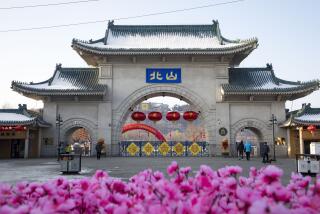China Campuses Become Shrines for the Fallen
- Share via
BEIJING — Tearful students in the main classroom building of the Beijing Institute of Politics and Law filed past the battered corpse of a victim of the Tian An Men massacre.
He had been brought to the school, one of the centers for pro-democracy agitation, by rescuers who had commandeered a taxi.
No one knows who he was or where he came from. His body lay packed in ice, partially draped in a Chinese flag and surrounded by humble prayer wreaths with messages praising his heroism.
‘Unknown Victim’
“This is the Unknown Victim,” explained a young law student at the institute. “He stands for all the dead slaughtered by the army.”
College campuses throughout Beijing were turned into memorial shrines for the dead on Monday. Students draped the gates of their schools in black and white bunting, the traditional mourning colors here, and hung banners bearing classical eulogies to the dead as well as political slogans of defiance in the face of military repression.
At some campuses, students brought stark icons from Tian An Men Square for viewing, including bicycles crushed by tanks and bloodied shirts from wounded students.
Through the grim atmosphere ran a strong current of fear. Students at campus after campus were convinced that at some point soon, the soldiers would invade and rout them from their cloistered schoolyards.
Hundreds of students died Sunday when soldiers fired automatic rifles into demonstrators occupying Tian An Men Square. Monday, concern that the army might crack down in a similar way on campuses prompted several foreign embassies, including the United States, to evacuate their students from the areas. The students were housed in private homes and hotels and some left the country.
Schools Remain Closed
In any case, campuses showed no sign of reopening even as the school year drew to a close and all-important examinations were scheduled to begin soon. Education, highly valued in this society and at least officially by the government as a means of bringing China into the 21st Century, is at a standstill.
“Exams are not important to us now. The sacrifice of the dead must not be in vain,” said a science student at Beijing University, China’s most prestigious school.
The Beijing University campus on the city’s northwest side appeared to be about half empty. Many students had fled for home or gone into hiding.
“Who among us is not afraid?” asked a student of Chinese literature. “Our government is made up of a bunch of animals.”
Students in a central courtyard of the university read poems to the dead and listened to a Voice of America broadcast blaring from loudspeakers.
A banner on a long exhibition case at the school read: “A Generation of Heroes Will Be Remembered in History.”
To the side, someone had posted a copy of the U.S. Bill of Rights in Chinese, as well as the preamble to the American Declaration of Independence.
A few blocks away at Beijing Teachers University, students on bicycles gathered in groups to ask about classmates and to hear tales about the assault on Tian An Men. One girl recounted the death of several protesters who were crushed by an armored personnel carrier that invaded the square.
The slightly built girl spoke so fast and so nervously that her classmates gently asked her to slow down. She did, but only for a moment, and then began to speed up as if trying to end the story as soon as possible.
At nearby People’s University, students hoisted the Chinese flag at half staff and posted giant Chinese characters over the main gate that said, “Elegy for a Nation.”
“The people do not have a government,” the students at People’s University chanted. “The government has no people.”
There were reports that students from People’s University had gained control of an army vehicle and had refused to give it back to the People’s Liberation Army. Late in the afternoon, students at the campus said they feared that the army would move against them first because of the taking of the armored car.
Activist leaders at People’s University met and decided that students should leave the campus if they felt endangered. But several students, from homes outside Beijing, said they lacked the money to return to their home provinces and feared getting picked up at the train station by the army.
“We really have nowhere to go,” said one student from Zhejiang province near Shanghai. “We have to make our stand here.”
More to Read
Sign up for Essential California
The most important California stories and recommendations in your inbox every morning.
You may occasionally receive promotional content from the Los Angeles Times.










